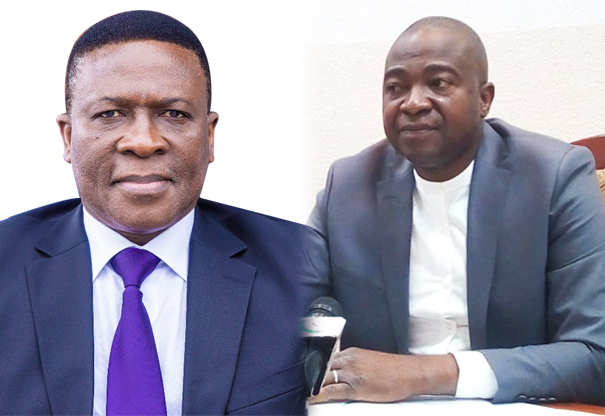Since the advent of the Rupture regime in 2016, a new wind has been blowing on the management of public expenditure in Benin, particularly in the control of the award of public contracts and their execution. With the focus on improving the business climate, promoting the private sector, consolidating public finances and the sound management of public funds.
“When the rhythm changes, the dance also changes”, they say. This adage seems to reflect what has been happening in management, procurement since 2016 in the era of the New Start government. Indeed, with Law No. 2020-26 of September 19, 2020 on the public procurement code in the Republic of Benin and its 11 implementing decrees, rigor both in the procurement procedures and in the controls and in the execution imposed itself on the various players in the chain of public expenditure. Persons Responsible for Public Procurement (PRMP) have even been presented to the Economic and Financial Brigade (BEF), to the Court for the Repression of Economic Offenses and Terrorism (CRIET), a special court responsible for the repression of the crime of terrorism, offenses or crimes of an economic nature as provided for by the criminal legislation in force as well as the repression of drug trafficking and related offences. According to Séraphin Agbahoungbata, President of the Public Procurement Regulatory Authority (ARMP), speaking on a television channel, “The public procurement system is the weakest link…. « . However, the actors have “the obligation to resist any form of attempt at corruption” despite a “system of public procurement (…) weak in the fight against corruption”, advised the president of the Beninese regulator of public procurement.
All-round exclusions and prohibitions for five years
The Public Procurement Regulatory Authority (ARMP) tirelessly plays its part in improving the management of public finances. « The exclusions for a period of five (05) years from public procurement and during this period, the interested parties, authors of the irregularities may not exercise any function in the chain of public procurement within the public administration or in the projects on external financing in Benin, nor apply for public contracts as an individual or personal consultant or in a group », are the sanctions pronounced by the ARMP through its decisions. Indeed, several officials of the public procurement chain have been excluded from public procurement. Nearly twenty have already been singled out. For example, the ARMP took a decision against the Town Hall of Klouékanmè in the Department of Couffo. The Person Responsible for Public Procurement (PRMP) of the Town Hall of Klouékanmè, Richard Otodji and Narcisse Akpla, Permanent Secretary (SP) of the PRMP are excluded from public procurement for a period of five (05) from June 13, 2022 due to irregularities noted in the procedure of a call for tenders. The Public Procurement Regulatory Authority (ARMP) sanctioned the two executives through a decision dated June 02, 2022. This decision by the ARMP, follows an appeal by Mr. Oscar Amadji, who was unable to take possession of the Tender Dossier relating to the construction of a fence of 75 linear meters for the benefit of the Nursery School of Klouékanmè Center, a latrine module of four cabins at the EPP Klouékanmè Center; a 1030 linear meter fence at the Hondji center school complex and a 455 linear meter fence at the Ahogbèya health center. According to the ARMP’s decision, the tender notice was not published in the public service daily newspaper as recommended by the Public Procurement Code. The PRMP and its Permanent Secretary (SP) disregarded several legislative and regulatory provisions on public procurement, particularly those relating to the principles of freedom of access to public procurement and equal treatment of candidates. Consequently, the ARMP orders the cancellation of the tender procedure. These various decisions rendered by the Public Procurement Regulator sound like warnings against procurement actors. It is a call to master the texts and to show rigor and vigilance in the procedures for awarding public contracts. “Things are no longer going the way they used to in public procurement. At the slightest error or fault or even irregularity, it is total exclusion for five years. And even presentations before the Economic and Financial Brigade (BEF), before the CRIET (Court for the Repression of Economic Offenses and Terrorism, Editor’s note), » said an expert in public procurement who requested anonymity. « All the actors in the management of public contracts think long and hard today to avoid exclusions or summonses before the BEF or the CRIET », added the expert in public procurement.
Arrests, cancellation and resumption of certain procedures, the novelties since 2016
Besides exclusions, bans on public procurement and conviction of certain officials, it is the cancellation or resumption of certain public procurement procedures. As proof, the ARMP recently canceled a tender procedure for the National Institute of Agricultural Research of Benin (INRAB). It must be said that sanctions are also pronounced against certain economic operators for fraud and corruption in the award of public contracts. The ARMP appears to be the well-armed policeman.
The ARMP, the watchdog of transparency and governance
The President of the ARMP, Séraphin Agbahoungbata, said on the subject of transparency reforms,: « with the texts and implementing decrees of Law No. 2020-26 of September 19, 2020 on the public procurement code in the Republic of Benin as well as all other publications of the Institution (audit reports, activity reports, training programmes), their ambition is to put public procurement regulation initiatives at the forefront to offer opportunities to compare ideas and experiences in this ever changing field. Among the other actions carried out by the institution for the regulation of public procurement, the ARMP works to safeguard productive investments for the benefit of the State, ensuring the triptych of time, quality and cost in projects of investments only in the ordinary activities of administration operations, an effective contribution to the improvement of the business climate, to the promotion of the private sector. Since 2016 in particular, the ARMP has been working to guarantee the efficiency and credibility of the public procurement system by promoting a transparent environment that promotes the optimization of public spending and better involvement of the private sector”. It must be said that with the reforms, the ARMP wants to be a benchmark institution in the sub-region in terms of public procurement regulation. Awareness campaign, around the code of ethics and professional conduct in the award of public contracts, training of the various actors of the public order, are all actions to the credit of the new ARMP team. Assistance to the competent national authorities in the definition of policies and the development of regulations in the area of public procurement; the organization of the training system for all actors in public procurement and the development of the professional framework; the implementation of technical audit procedures independent of public procurement as well as the sanctioning of irregularities observed; the non-judicial settlement of disputes arising from the award of public contracts and public-private partnerships; the conciliation of the parties in the event of disputes arising during the execution of public contracts and the facilitation of dialogue between the contract parties in the event of disputes within the framework of the execution of a public-private partnership contract, are, among others, the missions of the ARMP.
Self-assessment of the public procurement system
The use of public contracts is an essential measure to guarantee the State the provision of adequate public services to citizens. Given that it serves to test governance, equity, the efficiency of a sustainable economy and inclusive growth, public procurement represents on average worldwide, 12 to 20% of the Gross Domestic Product (GDP) each year according to a World Bank study. Hence, to achieve concrete, lasting results and to build effective institutions, it is essential today to strengthen the public procurement system. And the implementation of actions aimed at strengthening such a system is only made possible by means of the evaluation of the national public procurement system which provides the country with information that it can use to monitor the performance of its system, the success of reform initiatives to improve performance. Thus, thanks to funding from the World Bank, through the Public Investment Management and Governance Support Project (PAGIPG), Benin is organizing for the third time the self-assessment of its procurement system through the harmonized methodology for assessing the compliance of procurement systems with international standards (MAPS II). To achieve the expected result, the technical workshops of the national inter-ministerial committees are responsible for supporting the self-assessment of Benin’s national public procurement system. One of the important steps in this self-assessment is the use of data collected from the contracting authorities and the system as a whole, which will make it possible to draw up and finalize the concept note relating to the self-assessment mission of the public procurement system.
The DNCMP, the second hand of rigor in the management of public contracts
In the implementation of the reforms, the National Directorate of Public Procurement Control (DNCMP), acts as the Constitutional Court of Public Procurement. In the sense that it is it that authorizes requests for over-the-counter or direct agreement or in the event of a favorable opinion from the Council of Ministers as a last resort, at the request of the contracting authority. The DNCMP’s mission is, among other things, to: carry out a technical examination and check the conformity of the annual public procurement plans of the contracting authorities, have the said plans corrected if necessary and ensure their publication; issue a notice of non-objection on the tender documents and on their modifications if necessary; publish the calls for tenders sent to it by the contracting authorities; grant, at the request of the contracting authorities, the authorizations and derogations provided for by Law No. 2017-04 of October 19, 2017 on the public procurement code in the Republic of Benin; issue a notice of non-objection on the comparative analysis reports of the offers and the minutes of the provisional award of the contract drawn up by the Public Procurement Commission; carry out a legal and technical examination of the file or the public service delegation agreement before its approval, and if necessary, send to the contracting authority requests for clarification and/or modification in order to guarantee the conformity of the contract or the agreement with the tender dossier and the regulations in force; issue a notice of non-objection on draft amendments and requests for termination of public contracts and public service delegations; participate in the work of public procurement acceptance commissions and public service delegations under its jurisdiction; propose amendments to the legislative and regulatory texts in effect to the Public Procurement Regulatory Authority; coordinate the activity of the departmental public procurement control directorates; target contracts financed by the autonomous budgets of State companies and offices as well as other State structures with regards to expenditure whose amounts are greater than or equal to the thresholds marking the limit of competence of the Public Contracts Control Units of the said structures; granting authorizations to award contracts by mutual agreement, regardless of the amount. Still, for the proper management of public contracts, public contract control delegates are appointed in the ministries not only to respect the deadlines for awarding the order but also for the meticulous examination of public contracts.
In short, it can be said that with the new reforms, the five fundamental principles of article 7 of the public procurement code are: economy and efficiency of the procurement process; freedom of access to public procurement; equal treatment of candidates and tenderers; transparency of procedures; mutual recognition seem to be respected. As well as the respect of: deadlines given to public and other procurement control bodies. The rigor in the award of contracts, the suspensions of the actors of the order and their condemnation, led to the improvement of the business climate, the promotion of the private sector, the consolidation of public finances and the proper execution of public contracts.



